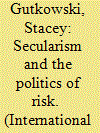| Srl | Item |
| 1 |
ID:
161262


|
|
|
|
|
| Summary/Abstract |
Guided by Michel Foucault's concept of “pastoral power,” this article examines the ways in which contemporary discourses within official narratives in China portray the state in a paternal fashion to reinforce its legitimacy. Employing interdisciplinary approaches, this article explores a number of sites in Urumqi, the regional capital of the Xinjiang Uyghur Autonomous Region (XUAR), in order to map how a coherent official narrative of power and authority is created and reinforced across different spaces and texts. It demonstrates how both history and the present day are depicted in urban Xinjiang in order to portray the state in a pastoral role that legitimates its use of force, as well as emphasizing its core role in developing the region out of poverty and into “civilization.”
|
|
|
|
|
|
|
|
|
|
|
|
|
|
|
|
| 2 |
ID:
108061


|
|
|
|
|
| Publication |
2011.
|
| Summary/Abstract |
Little has been said in the international relations (IR) literature so far about the connections between secular ideas and identification of risk. However, there are striking parallels. 'Western', secular discourse(s) have framed Islamist terrorism as slippery, uncontainable, mysterious and strange. Similarly, risks are often described as 'diverse, amorphous and qualitative'. Starting from this observation, this article explores connections between ongoing conversations about the politics of risk and insights from the emerging literature on secularism and international politics. Using the British 'Prevent' agenda of 2005-09 as a case study, it asks how it is that political secularism and cultural secularity have contributed to perceptions of danger emanating from the Muslim population. It explores the potential implications of these perceptions for state security policy. The article also explores Foucault's account of pastoral governance as a potentially useful framework for scholars of risk, particularly for describing the ambivalence inherent in much risk-management practice.
|
|
|
|
|
|
|
|
|
|
|
|
|
|
|
|